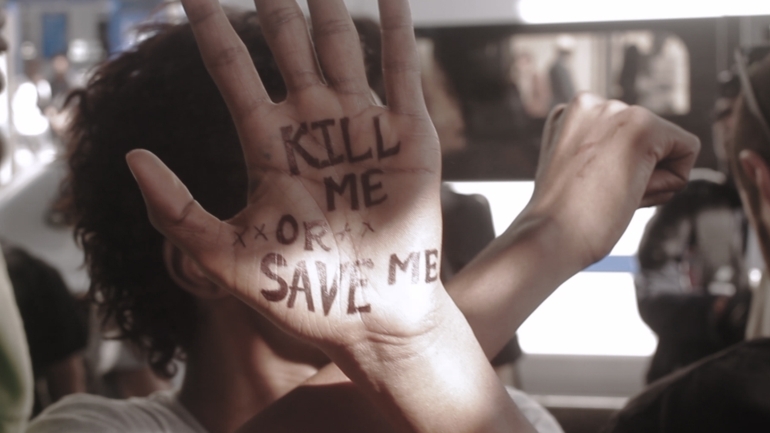Begin of page section: Content

Presentation of Short Films about Police Brutality against Refugees in Paris
[Text Statement by the Filmmakers]
Hard to believe the situation of migrants in Paris. They are facing police brutality, institutional violence, and extreme precarity. You can even doubt of your own eyes when you see it. Left in the streets, they suffer to live in the cold and sickness, as much as they suffer not to find help and consideration. They came through the sea, risking their lives, and once arrived in France, the government refuses to receive them, refuses to host them, refuses the possibility for them to gather, and even refuses them water and food. With no shelter, no camp, they have to sleep in the public space, under bridges, metro, or along the canal in Paris. Almost every single day the police hunt them and harass them, in the small streets like in the big ones, they arrest them, put them in cells and in jail. Among them there are women, children, a lot of women alone and pregnant, babies, chased by the police who arrests them and doesn’t offer them any solutions except being chased again day by day. The police come early in the morning, takes position in the neighborhood where they sleep together, and surrounds them with the well known tactic of Kettling. Once taken them to the police station, it has been reported several times that policemen asks them to sign a OQTF (obligation of leaving the French territory within 30 days) by pretending it is a paper to get a place in a shelter. Between July 31 and October 1, more than 3,000 migrants were arrested in the street, several times for a number of them, 90 were placed in detention centers, hundreds of orders to leave France have been distributed. Some have been arrested in the queue where they must wait to get an asylum folder, and have been sent to jail on the grounds that they don’t have this folder. This system is deliberately organized by the Interior Minister to put the refugees in a very fragile situation and to dissuade them to stay in Paris. But according to the law, arresting a refugee before he could start his asylum proceedings and giving him a notification to leave the country is a violation of asylum international right. Everyday, Paris and Ile de France Police headquarters are violating the law. A collective of associations complained against this situation and got M. Caranco, chief of Ile de France headquarters condemned 135 times. Sometimes the police operations are presented to the press and the medias as “sheltering”, which consists most of the time of being deported to seedy hotels where no food is distributed. The authorities justify their actions by saying they fear terrorism, at least when they're not simply denying it.
As filmmakers, we thought it was obvious we had to documents this, but by doing that we’re not making films we’re trying to save our own humanity. Our city violates the asylum laws everyday, deliberately leaves children in the streets, while pretending being a « city of refuge ». Then we are forced to conclude that our police is ashamed of his action if we count the number of times they assaulted us to prevent us from making images. After the various terrorists attacks which hit the city we could glimpsed what decides a family to take a makeshift boat to Europe, but we are frightened to see that the State response is only violence. We are not witnessing a « migration crisis » in France, but obviously a totalitarian drift of the State. Added to violence against migrants, everyday, the French Police is becoming more and more violent against anyone who try to express solidarity with them or demonstrate any disagreement with the State policy.
For several months, we are alongside small groups of ordinary people who only have their limited means to oppose, tirelessly, to the brutality of a world where the ends justify the means. We need to talk, and to organize ourselves.
Friday, 21 Oct
23:00 - 00:00
Forum Stadtpark
Stadtpark 1, 8010 Graz
Film
Q+A
Information & Links
Hind Meddeb (fr)
Joseph Paris (fr)

#e16refugeesparis
End of this page section.
Skip to overview of page sections.